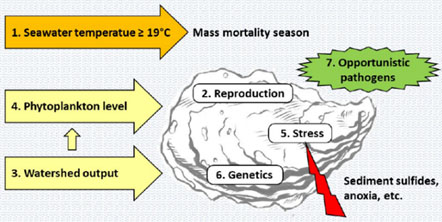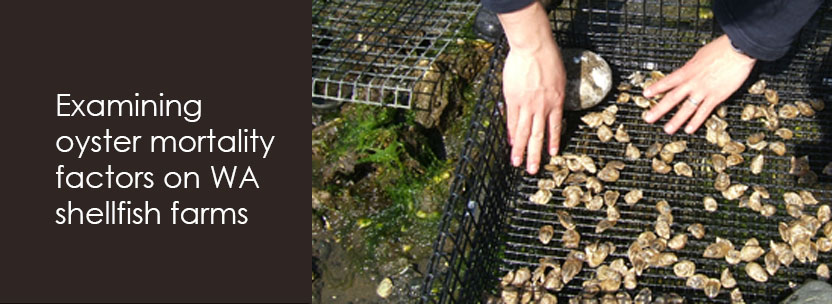|
This project examines recent increases in summer mortality events of triploid Pacific oysters (Crassostrea gigas) in the Pacific Northwest and assesses the applicability of the MOREST hierarchical interaction model.
Significant C. gigas summer mortality events have occurred with increasing frequency and severity over the past sixty years. These events affect both triploid and dipoloid oysters, often during the second year of growout when they near market size. In Washington State, losses have reached 20%-80% in multiple commercial growing areas in recent years. This concerning trend is also reported by shellfish farms in other west coast states and within British Columbia, Canada.
Previously, PSI has collaborated with several research institutions to examine disease and health issues for Pacific oysters along the U.S. west coast during summer mortality events. We specifically examined:
1) environmental factors triggering a mortality-inducing stress response; 2) survival and yield in selectively bred and hybrid families; 3) relationships of culture practices to oyster survival; 4) responses of oysters to bacterial pathogens and potentially harmful phytoplankton; and 5) the extent and nature of mortality events on commercial oyster beds through collaboration with shellfish growers. The scope and complexity of the issue, along with recent mortality events warrants further examination. Previous research conducted by PSI and collaborators will serve as a foundation to expand current knowledge of the issue.

MOREST hierarchical interaction model for summer mortality.
PSI and co-PIs have four major objectives:
1) develop and maintain a geo-referenced data platform with industry partnership to attribute non-proprietary mortality statistics to shellfish growing areas; 2) provide oyster health and condition diagnostic evaluation to farms paired with associated training in sampling collection and submission; 3) evaluate oyster performance at sites within significant oyster producing regions in Willapa Bay and Puget Sound; and 4) compare reproductive status and digestive gland condition in diploids and triploids on test plots across relevant spatial and temporal environmental gradients, through the growing season.
Project Leaders: Bobbi Hudson (PI), & Co-PI Dr. Dan Cheney from PSI, Co-PIs Drs. Joth Davis and Dennis Hedgecock from Pacific Hybreed, Dr. Ralph Elston from Aquatechnics, and Molly Jackson from Taylor Shellfish Farms. This project is funded by the NOAA Saltonstall- Kennedy Grant NOAA-NMFS-FHQ-2021-2006561.
Partners:
Project Summary (printable 1-pg PDF)
Support ($) For Oyster Health Diagnostics: Funding is available to cover the cost of diagnostic screening for shellfish farms in WA, OR, CA, and AK. Contact PSI for details. Shellfish collection and submission instructions are available for the following:
|
|
Report Oyster Mortality:
PSI has developed a simple Shellfish Mortality Reporting Form. This form is completely voluntary and will take less than 5 min to complete. No proprietary questions are asked, and responses will be used for research purposes only. A pdf copy of the form is available here if you prefer to print the form and email or mail it to our office.
If you have questions about the form or would like to contact us directly, email our team at psi@pacshell.org
Why It's Important:
Voluntary reporting of shellfish mortalities is an important source of information for tracking direct impacts of summer events on local growers. It allows PSI and partners to track potential hotspots and link those locations with potential stressors, as well as looking at potential temporal trends within specific areas. This in turn will contribute to further understanding these recent mortality events, their causes, areas of particular concern, and potential actions to mitigate the effects on growers.
Prior Seed Health Results
|













